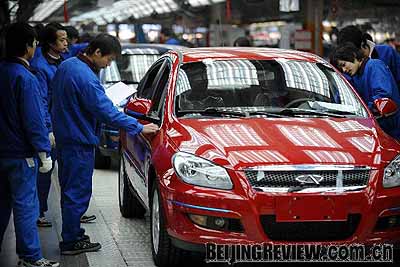|

The current financial crisis has devastated the global auto industry. On December 19, 2008, U.S. President George W. Bush unveiled a $17.4 billion rescue fund to bail out General Motors and Chrysler, two of the best-known manufacturers in the United States, and help them avoid bankruptcy. A few days later Japan's largest carmaker, Toyota Motor. Corp., forecast its first loss in 71 years. Most recently, the European Union moved to rescue its carmakers by calling a ministerial meeting.
Under these circumstances, what is the state of affairs in China? How will China's auto enterprises, a pillar industry in the country, fare in the current economic climate?
"China's auto industry is not so bad, although both the stock market and housing industry had fallen right before the eruption of the global financial crisis," auto analyst Li Anding was quoted as saying by Beijing Times.
Statistics from the China Association of Automobile Manufacturers (CAAM) showed growth in both auto production and sales last year was down 7 percent year on year. The number of autos yielded by the industry in 2008 stood at 7.34 million, and the number sold was 9.38 million.
Although overall sales growth is slowing, there are some bright spots in China's auto market.
For instance, in the first 11 months of 2008 vehicle exports by Chery Automobile Co. reached 130,000, with 10,000 more expected by the end of December, Chery told Xincaijing (New Finance Economics) magazine. Although it falls short of the company's target of 180,000, the figure is 20 times more than total exports in 2004 and surpasses total exports in 2007.
Chery received 10 billion yuan ($1.47 billion) in loans from the Export-Import Bank of China last December to expand its international businesses, according to Xincaijing.
Hu Enping from Beijing Hyundai told Xincaijing that the company's vehicle sales totaled 266,000 in the first 11 months of 2008, more than the total number in 2007. Cars under 1.8 and 1.6 liters enjoyed strong sales in the first 11 months, Hu said.
First Automobile Works (FAW) told Xinhua that its vehicle sales hit 1.53 million in 2008, a year-on-year rise of 6 percent.
"Many industries were badly hit by the global crisis in 2008," Hu said. "I don't think the auto sector can escape the financial tsunami. Consumer confidence, for example, was seriously affected, as many people who planned to buy cars began to reconsider."
CAAM's statistics indicated that 82 percent of carmakers in China failed to meet their yearly targets in 2008, and 19 auto enterprises experienced negative profit growth.
To boost the industry, China's State Council announced a precautionary support package for the auto sector on January 14.
Under the plan, the sales tax on cars with engines smaller than 1.6 liters will be cut in half, effective Jan. 20 and continuing until the end of the year. The plan also includes several other measures to prop up the industry, including encouraging carmakers to expand through mergers and acquisitions; giving them money to upgrade technology and develop new engines using alternative energy; and helping automakers develop independent brands and improve the credit system for auto purchases.
The plan is widely considered to be beneficial for the auto industry. "The plan will greatly invigorate the market," analyst Jia Xinguang told Shanghai Securities News.
"Now is the right time for the government to give favorable policies to the auto sector," Shanghai Securities News quoted Chery Deputy General Manager Jin Yibo as saying. "If the government had waited until the situation became more serious, it might have been too late." | 